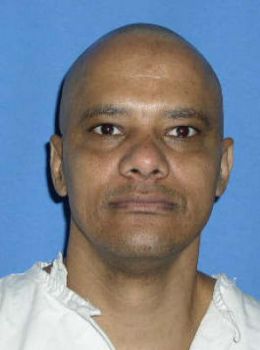Michael Wayne Richard (Michael Wayne Richard)

Michael Wayne Richard (August 24, 1959 – September 25, 2007) was convicted of rape and murder whose execution gained notoriety due to controversies regarding procedural problems related to the timing of the execution. Richard admitted he was involved in the murder and offered to help find the murder weapon. Police found the weapon and testing revealed it to be the gun that fired the fatal shot. On 18 August 1986, in Hockley, Texas, while on parole for motor vehicle theft, Richard entered the home of Marguerite Lucille Dixon, stole two television sets, raped Dixon, fatally shot her, and then stole her van. In the wake of the Supreme Court of the United States expressing interest in the question of the constitutionality of lethal injections, on the same day that the execution was scheduled, Richard’s lawyers sought a stay of execution.
The stay request had to be filed with the Texas Court of Criminal Appeals in Austin. The execution was scheduled for 6 PM, but the court’s clerks office, where motions are usually filed, was scheduled to close at 5 PM, and refused to remain open beyond then to allow a later filing. Richard’s lawyers claimed that, because of a computer failure, they did not reach the Court of Criminal Appeals until about 5:20 PM. Although there was a judge on call to receive emergency stay motions, and although Texas law would have allowed the stay application to be filed with any judge of the court, the lawyers did not attempt to contact any of them. Richard was subsequently executed at 8:23 PM on September 25, 2007 at Huntsville, Texas. On February 19, 2009, the Texas State Commission on Judicial Conduct brought seven charges against Judge Sharon Keller, alleging ethical improprieties in Keller’s handling of the case.
The Special Master assigned to the case found the Texas Defender Service to be primarily at fault in the failure, and although he concluded that Keller’s actions were inadequate, found she had violated no standard and recommended no further punishment. The Special Master’s findings cast doubt on a number of the reported issues in the case. He concluded that there was no evidence that the Texas Defender Service suffered any significant computer failure; although news reports had mentioned multiple “crashes”, the only claim that the TDS repeated during the hearings was that there had been some problems with an internal email service, and no documentation was even produced about that. Contrary to one of Richard’s lawyers’ earlier comments about the court refusing to stay open “20 minutes”, the Special Master found the filings were not ready until 5:56 p.m., with the execution authorized for any time after 6:00 p.m. He also found fault with the attorneys for assigning only a junior attorney to prepare the documents; for delaying two hours past the US Supreme Court’s grant of certiorari in Baze v. Rees, the case that would eventually determine the constitutionality of the execution procedure, before even discussing preparing a motion in Richard’s case; and for relying on paralegals to contact the clerk’s office about the filing, without any attorneys attempting to directly contact a judge or the Court of Criminal Appeal’s General Counsel. The Special Master criticized the TDS for “causing a public uproar against Judge Keller, much of which was unwarranted”.
Born
- August, 24, 1959
Died
- September, 25, 2007
- USA
- Huntsville, Texas
Cause of Death
- execution by lethal injection

